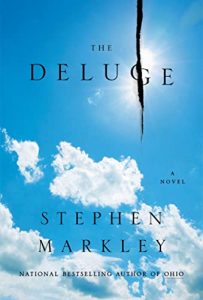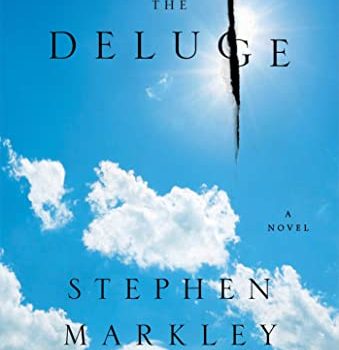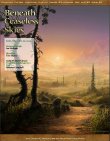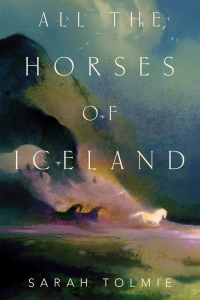Ian Mond Reviews Deluge by Stephen Markley
 The Deluge, Stephen Markley (Simon & Schuster 978-1-98212-309-3, $32.50, 896pp, hc) January 2023.
The Deluge, Stephen Markley (Simon & Schuster 978-1-98212-309-3, $32.50, 896pp, hc) January 2023.
I won’t lie. I balked at reading Stephen Markley’s second novel, The Deluge. At nearly 900 pages, I knew it would take me two weeks to read, time I could spend working through a backlog of 2023 books that I’ve been meaning to pick up (including new novels from Francis Spufford, Daniel Mason, Emily Habeck, Helen Macdonald, and so on). What persuaded me was James Bradley’s effusive praise for The Deluge and an essay by Matthew Cheney – ‘‘Long Novels, Short Lives’’ – where he argues that the best long novels (Moby Dick, 2666, Crime and Punishment) have a transcendent quality that’s not matched by shorter works. The Deluge, which ambitiously chronicles the climate catastrophe over three decades, may not sit alongside the classics Cheney quotes in his piece, but I found reading the book to be a truly profound and visceral experience.
Markley adopts a narrative strategy similar to Richard Powers in The Overstory by charting the planet’s ecological collapse from the perspective of a handful of key individuals whose lives intersect. The vibrant cast includes the following:
Doctor Tony Pietrus, a curmudgeonly oceanographer and climatologist who sounds the alarm about the coming disaster and is mainly ignored (not helped by a scathing review in the Wall Street Journal of Pietrus’s book One Last Chance);
Kate Morris, a charismatic and radical eco-activist whose climate justice group, ‘‘A Fierce Blue Fire,’’ pisses off both sides of Government (strikingly, Markley chooses to tell Kate’s story from the viewpoint of her long-term partner Matthew Stanton, meaning we only know her from a distance);
Shane Acosta (not her real name), a founding member of the ecoterrorist group ‘‘6Degrees’’ or ‘‘The Weatherman,’’ who have successfully destroyed oil and gas infrastructure (Shane’s chapters, written in third person, include nifty breakout boxes that define key terms and provide additional details about the characters and their state of mind);
Ashir al-Hassan, a neurodivergent maths prodigy whose modelling, initially used to predict the outcome of basketball games, becomes central to understanding and even addressing the threat of climate change (rather cleverly, Ashir narrates his feelings and anxieties through the medium of briefing notes, complete with an abstract and conclusion);
Jackie Shipman, a talented advertiser who lobbies for the oil and gas interests pitted against Kate Morris and ‘‘A Fierce Blue Fire’’ (she once had a fling with a famous actor who, decades later, will take on the role of ‘‘The Pastor,’’ the populist leader of a powerful and violent virtual church); and
John Gerald (AKA Keeper), a drug addict who, desperate for money, unwittingly does a job for ‘‘6Degrees,’’ which sees him end up in prison (these chapters are written in second person and are by far the most confronting).
The Deluge is an astonishing novel, right up there with Hilary Leichter’s much (much!) shorter Terrace Story as one of the best books of the year. But given its girth (it took me 12 days to read) and the novel’s litany of climate catastrophes – oppressive heat domes that last for months, an enormous hurricane that impacts 21 states, a fire so wild in its intensity it reduces Los Angeles to a cinder – I did find myself asking the question: What is Markley setting out to achieve? The answer for Jonathan Russell Clark, who reviewed The Deluge for the Los Angeles Times, is to shock us out of our stupor, though Clark isn’t convinced that Markley succeeds. ‘‘Repeated finger-wagging, even the most deftly and eloquently crafted, grated after almost 900 pages.’’ Judgment about quality aside, Clark is right in thinking that Markley is hoping to wake us up, even if the author recognises that The Deluge is unlikely to move the needle. That’s evident in Markley’s depiction of America’s broken political system, conflicting ideologies (even from those who broadly agree) and the growing radicalisation of the right wing, fuelled by evangelical faith and grass-roots white supremacists, all of which impedes any chance of keeping the increase in global temperature below 1.5 degrees. Nevertheless, the fact the novel doesn’t start in the aftermath of the wreckage wrought by climate change but charts out in exacting, brutal, and horrific detail the devastation of our world in my and my children’s lifetime suggests a hope, no matter how small, that someone, anyone, is listening. What Clark sees as ‘‘finger-wagging’’ made me appreciate how close we are to the precipice.
The narrative is kept fresh by Markley’s willingness to experiment with form (and even to suggest that Artificial Intelligence wrote some parts of the book), helped along by interstitial material such as headlines from newspapers of the period and the aforementioned hatchet job of Tony Pietrus’s book. As a longtime Stephen King fan, I enjoyed the references to The Stand, not just that the leaders of ‘‘6Degrees’’ use it as their codex when sending covert messages, but also the Randall Flagg-like qualities of ‘‘The Pastor,’’ who whips up violence from his online safehold. But really, it’s the set pieces, such as Tony’s headlong rush into the fires of Los Angeles to save his daughter or the thousands and thousands of people – led by Kate – flooding Washington to occupy the city, that are breathtaking in their cinematic detail.
A book this long will have its flaws. While the first decade of the novel cleaves to our timeline, with references to the fires in Australia and COVID-19, the brief mentions of Joe Biden (who doesn’t run for a second term) and Trump, especially Trump (who unbelievably fades into the background) didn’t sit right with me. Also, for a book this long, the climax is rushed, particularly the section where Markley sketches out the social, political, and engineering effort to arrest the rise in global temperature. Still, I was so invested in the narrative, in the ambition and epic scope of Markley’s project, that these issues didn’t matter. The Deluge isn’t just a remarkable book; it’s an important one.
Ian Mond loves to talk about books. For eight years he co-hosted a book podcast, The Writer and the Critic, with Kirstyn McDermott. Recently he has revived his blog, The Hysterical Hamster, and is again posting mostly vulgar reviews on an eclectic range of literary and genre novels. You can also follow Ian on Twitter (@Mondyboy) or contact him at mondyboy74@gmail.com.
This review and more like it in the December and January 2023 issue of Locus.
 While you are here, please take a moment to support Locus with a one-time or recurring donation. We rely on reader donations to keep the magazine and site going, and would like to keep the site paywall free, but WE NEED YOUR FINANCIAL SUPPORT to continue quality coverage of the science fiction and fantasy field.
While you are here, please take a moment to support Locus with a one-time or recurring donation. We rely on reader donations to keep the magazine and site going, and would like to keep the site paywall free, but WE NEED YOUR FINANCIAL SUPPORT to continue quality coverage of the science fiction and fantasy field.
©Locus Magazine. Copyrighted material may not be republished without permission of LSFF.








Yeah, but the assumption that the US is the crucial actor in climate change is simply wrong.
We produce something like 10-11% of global CO2.
China produces more than twice that; and while our output is fairly stable or slightly declining, theirs is skyrocketing. China produces more CO2 than Japan, the US, Canada, the UK and the entire European Union -put together-.
China burns 2 -billion- tons of coal, has announced plans to mine 300 million more tons, and has 250 Gigawatts of coal-fired generating capacity under construction.
India and Indonesia are coming up fast behind them, btw.
Basically, nothing we do matters crap.
Yeah, but the assumption that the US is the crucial actor in climate change is simply wrong.
We produce something like 10-11% of global CO2 annually.
China produces more than twice that; and while our output is fairly stable or slightly declining, theirs is skyrocketing. China produces more CO2 than Japan, the US, Canada, the UK and the entire European Union -put together-.
China burns 2 -billion- tons of coal a year, has announced plans to mine 300 million more tons, and has 250 Gigawatts of coal-fired generating capacity under construction.
India and Indonesia are coming up fast behind them, btw.
Basically, nothing we do matters crap.